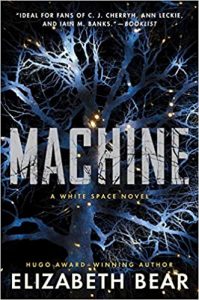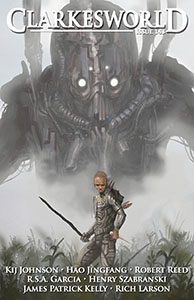Liz Bourke Reviews Machine by Elizabeth Bear
 Machine, Elizabeth Bear (Saga 978-1-5344-0301-7, $25.99, 460pp, hc) October 2020.
Machine, Elizabeth Bear (Saga 978-1-5344-0301-7, $25.99, 460pp, hc) October 2020.
One thing about Elizabeth Bear’s Machine, the second novel set in her White Space universe after 2019’s Ancestral Night: it’s sure as hell not either shallow or amoral. It is, in fact, fundamentally engaged in wrestling with questions of ethics, culture, worldview, and how much restitution needs to be made when one does harm in order to do other kinds of good. Also the question of belief in institutions, and how to build on belief and faith in the good parts of things that are revealed to be corrupt, or that have failed you.
Brookllyn Jens is a doctor – a rescue specialist, attached to the Synarche Medical Vessel I Race To Seek The Living (also known as Sally), and operating out of the giant multi-species hospital station known as Core General. Jens is part of a mission to help find and retrieve survivors from a Synarche vessel that encountered a long-lost (centuries lost) generation ship and went dark after reporting on this. There are survivors on the generation ship, but in jury-rigged cryostasis pods, and the generation ship’s AI, or shipmind, Helen, is unhealthy: emotionally unstable in the fashion of AIs, at minimum. And the crew of the Synarche vessel, a species sufficiently different to Jens that even the light she needs to see would be inimically damaging to them, appear to have entered a kind of hibernation. And there is a bizarre, weapon-like ship or structure in the Synarche ship’s hold.
Jens’ first set of problems encompass getting some of the cryo-preserved generation-ship inhabitants – and the AI, and the Synarche ship – back to Core General without seeing them experience any more damage. The second set of problems involves sabotage at Core General. Jens used to be in law enforcement, and is therefore naturally the right person to ask to look into what may or may not be politically-motivated sabotage. Especially since neither she nor the rest of Sally‘s crew are going out on rescue missions until the sabotage on Sally is checked out. Her third set of problems involves becoming a temporary cultural liaison to the one or two primitive humans who have successfully been retrieved alive from the (primitive) cryostasis so far.
These problems might be enough for anyone, but on top of that, Jens uncovers some uncomfortable secrets about things going on in at least one of Core General’s private wings. And the sabotage peaks in the kind of damage that leaves parts of Core General without light or power and leaves doctors and other personnel struggling to save lives under extremely difficult circumstances. Along with the Goodlaw Cheerilaq – an officer of the law from a species whose female members resemble giant preying mantises – the revived generation-ship human Master Chief Carlos, and a handful of others, Jens is critical to the resolution of the problem of what exactly is going on at Core General.
Science fiction is often epic in scale: rarely is that scale both epic and also largely confined to professional settings and occupations. But Jens is a professional among other professionals: in many ways, her choice of career and the choices she has made in order to pursue her career define her life. They define it much more than the disability that is part of her daily experience, though only assistive technology allows Jens to both live with that disability and carry out the career that she’s chosen.
Jens is a fascinating character. The narrator of Machine, she is – in all her flaws, determination, skill, friendships, and conviction – very easy to relate to, and to empathise with, in her human complexity, triumphs, and failures. Her past holds a wife and a child she left behind: the child is nearly adult, and she has seen neither of them in person since the child was very small. Jens is also about as confident as any doctor that jumps out of spaceships for a living would have to be.
Though Machine is set in the same world as Ancestral Night – in the Synarche, with its vast diversity of people and species, its peculiar form of government, and its technological advances and social compromises – it has a similarly engaging voice, for all that Jens is a very different character to Ancestral Night‘s Haimey, and a similarly engaging approach to pacing: Machine isn’t a short book, but it’s a very fast read for its length. Bear has a striking command of tension and character, and a deep interest in ethics and human behaviour.
There’s a thematic argument – like the majority of Bear’s novels, an argument with many sides – that’s all about faith, institutions, people, and the worth of the personal and politic cost of where you choose to put your faith and your hard work.
It’s impossible, if you’re aware of James White’s Sector General stories and novels, not to see Machine as in conversation with that particular lineage. (I think I’ve read all of one Sector General story, but the influence is clear.) Space opera rarely concerns itself with the medical, and with the challenges of workaday life: it’s an untapped vein, and Bear draws from it with characteristic deftness and skill.
Machine is a fascinating, compelling, and ultimately satisfying space opera in a vast, complex, weird, and interesting universe. I really enjoyed it, and I hope this isn’t the last novel to concern itself with Core General, or with the Synarche at large.
Liz Bourke is a cranky queer person who reads books. She holds a Ph.D in Classics from Trinity College, Dublin. Her first book, Sleeping With Monsters, a collection of reviews and criticism, is out now from Aqueduct Press. Find her at her blog, her Patreon, or Twitter. She supports the work of the Irish Refugee Council and the Abortion Rights Campaign.
This review and more like it in the October 2020 issue of Locus.
 While you are here, please take a moment to support Locus with a one-time or recurring donation. We rely on reader donations to keep the magazine and site going, and would like to keep the site paywall free, but WE NEED YOUR FINANCIAL SUPPORT to continue quality coverage of the science fiction and fantasy field.
While you are here, please take a moment to support Locus with a one-time or recurring donation. We rely on reader donations to keep the magazine and site going, and would like to keep the site paywall free, but WE NEED YOUR FINANCIAL SUPPORT to continue quality coverage of the science fiction and fantasy field.
©Locus Magazine. Copyrighted material may not be republished without permission of LSFF.







Allen Nourse had a couple of juveniles with medical themes.
I will put this book on my list
Incredibly frustrating read. The world building is epic; the characters varied and with depth; and the philisophical explorations were enjoyable. What was not enjoyable was the constant failure of the main character to pursue blatant leads in the investigation – one of the primary drivers of the story – effectively kicking me out of the narrative every few chapters. Given Bear’s great skills, I am at a loss as to the reason for this.